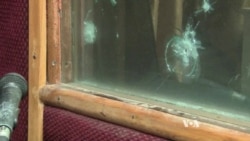The battle for Burundi has centered on control of the country’s influential radio stations. That private and government media have both been casualties of the recent political violence.
Radio Bonesha in Bujumbura is officially off the air.
Last Thursday, the day of the coup, journalists at the private station said security forces came in and destroyed their equipment.
Editor in Chief Leon Masango said the attack was clearly politically motivated.
“Policemen and military that said they were loyalists came here to destroy our material,” he said. “We had done nothing wrong. We are only here to inform the population.”
Another private station, Radio Publique Africaine, was burned down during the crisis.
Authorities here accuse the local media of supporting the protests against President Pierre Nkurunziza’s bid to run for a third term in office - a plan the opposition said violates the law.
Tensions mounted over the course of several weeks, finally boiling over when dissident members of the armed forces announced a coup against the president.
Government spokesman Willy Nyamitwe said the private radio stations were complicit in the attempted takeover.
“They were with the plotters because the plotters were in their studios and they have been broadcasting this and even some songs and they have been accompanying this plot as partners,” he said.
Journalists at the private stations deny being part of the coup.
Meantime, the government has heavily guarded its own state media.
VOA tried to film the state broadcaster RTNB, but soldiers guarding the area wouldn't let us point our cameras in that direction.
Amateur footage obtained by VOA shows a demonstration outside the state broadcaster days before the coup. It turned violent when police open fire on protesters.
Rebel military forces later attacked the station during the coup, briefly forcing it off the air.
Taking control of broadcast operations is a typical strategy during conflict, according to RTNB television director Nestor Bankumukunzi.
“In countries like Burundi, when there has been a coup, they always go first to the national radio to be able to broadcast their message to the population. It’s typical when there’s a coup,” he said.
With other stations shut down, RTNB is now the only local media outlet left in Burundi.
In a country where radio is king, it is no surprise that the fight for control of the government has centered so much on who controls the airwaves.





